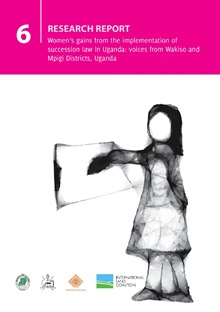Resource information
Poverty, particularly among female-headed households in Uganda, is strongly related to lack of access to and ownership of productive resources. Recent land reform necessitates inquiry to determine whether it has improved women’s marginalized status with regard to land ownership and access.
In Uganda, land rights are based on birth rights traced through patrilineal descent, a tradition that is particularly observed in rural areas and also documented in the statutory. The Succession Act in particular identifies the persons eligible for inheritance and their respective entitlements. In an earlier evaluation of the effectiveness of the statutory law, the practices of the Administrator General’s (AG’s) office were studied, focusing on how they award women their inheritance rights. More women in the central region were bequeathed land and matrimonial homes than in the western region.
This data is attributed to the fact that few of the deceased from other regions registered land. In addition, probate to administer estates is more likely to be granted to males than to females. On the other hand, among the intestate, females are more likely to become administrators of estates, which accords them control over property.
Findings show that more males (22 percent) obtained land than females (18 percent), though the AG grants a slightly higher proportion of money to female children (19 percent) than to male children (17 percent). Research was necessary to establish whether current land reform has necessarily granted women any more ownership rights than traditional practices have accorded them.
You can download this publication on the website of the International Land Coalition or below. A policy brief is also available.

